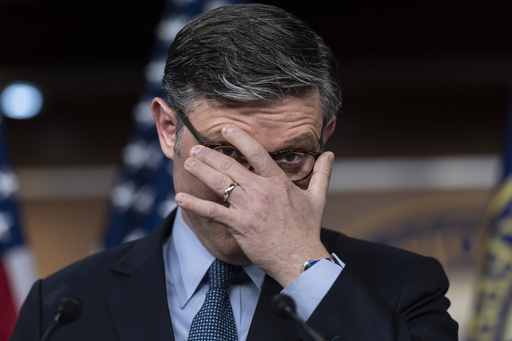
In the nation’s capital, House Speaker Mike Johnson is working diligently to address President-elect Donald Trump’s unexpected requests, putting a potential government shutdown in jeopardy. With the deadline approaching at midnight on Friday, federal agencies have been instructed to prepare for a halt in operations.
In a statement made early Thursday, Trump suggested that Johnson could solidify his role as Speaker for the upcoming Congress if he acts “decisively and tough” to formulate a new strategy that would also involve raising the debt ceiling. This surprising demand just days before the Christmas holidays has placed considerable pressure on the already embattled speaker.
Trump further indicated that if Johnson fails to respond appropriately, there could be negative repercussions for both him and the Republican Party. “Anyone who supports a bill that doesn’t address the Democrat-created debt ceiling problem should be primaried and removed quickly,” he told Fox News Digital.
The dramatic shift in events comes as lawmakers were anticipating the holiday recess, triggering memories of past crises under Trump’s leadership. Notably, Trump orchestrated the longest government shutdown in U.S. history during the 2018 holiday season and disrupted the 2020 holidays by derailing a bipartisan Covid-relief bill.
As Johnson grapples with these pressures ahead of the January 3 House vote for his continuation as Speaker, his late-night sessions have become more intense. Vice President-elect JD Vance was present during those discussions, even bringing his young son, comfortably dressed in pajamas.
Additionally, some of Trump’s aides humorously proposed the idea of appointing billionaire Elon Musk as Speaker, noting that one does not need to be a member of Congress for the position.
Majesty Leader Steve Scalise, after leaving a late-night meeting in Johnson’s office, expressed optimism about their discussions. “We had a productive meeting, and we will continue negotiating through the night to reach an agreement,” he stated.
However, opportunities to include a debt ceiling increase in what was initially a bipartisan proposal are challenging, particularly for Republicans who typically oppose more borrowing. The existing debt limit is scheduled to expire on January 1, 2025, and Trump aims to resolve this issue before assuming office.
As senior Republicans exited the Thursday morning meeting in the Speaker’s office, they had yet to reach any consensus on how to proceed. Representative Tom Emmer, a key leader within the party, described the situation as “fluid.”
This funding crisis comes as temporary federal funding is set to expire at midnight Friday; the current funding bill is running out just as Congress is attempting to draft a new measure to maintain operations for the next few months. Johnson’s proposed bipartisan compromise with the Democrats sought essential disaster relief, notably $100.4 billion for states affected by Hurricanes Helen and Milton, alongside other natural disasters.
Nonetheless, the expansive 1,500-page bill has drawn ire from conservative factions, particularly due to its spending provisions. Musk, now engaging actively in politics, has taken to the social media platform X to amplify the dissatisfaction, inundating GOP lawmakers with calls urging them to reject the proposal.
Trump expressed his discontent later in the evening, insisting Johnson initiate a fresh approach with an emphasis on the debt ceiling, a contentious issue that typically warrants extensive negotiations and is commonly opposed within his party.
Democrats emerged from a closed-session meeting on Thursday, frustrated by the disintegration of bipartisan talks, reaffirming that agreements should be honored. Democratic Leader Hakeem Jeffries criticized the timing of Trump’s debt limit demands as “premature.”
“There’s no need for this shutdown instigated by reckless Republican actions,” Jeffries argued, urging his colleagues to abide by the previously negotiated bipartisan terms.
Even as Democrats have previously suggested alternatives for raising or eliminating debt ceiling restrictions, they appear unyielding in their stance to assist Johnson amid Trump’s newfound pressures, even before he officially steps into his role in office.
House Democratic Whip Katherine Clark described the ongoing chaos, highlighting the consequences a government shutdown would impose on everyday Americans and attributing it to decisions made by unelected figures like Musk influencing Trump.
Officials from the White House’s Office of Management and Budget have preliminary communicated to agencies regarding potential shutdown preparations, indicating an awareness of the rising urgency.
In a late Wednesday discussion, Republicans proposed scaling down their bill simply to ensure government continuity while still allowing aid for disaster-affected areas. However, moments after it was brought up, Trump took to social media again to express his disapproval of that strategy.
Scalise acknowledged Trump’s desire to start the presidency positively, which aligns with the Republicans’ intentions. “We understand that, but we must first navigate through this hurdle, and we hope to resolve it soon,” he concluded.
